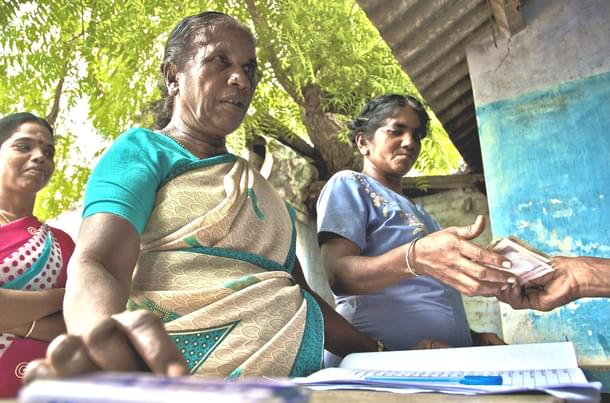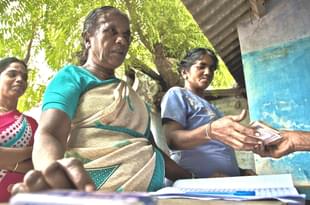Politics
Citizenship For Lankan Tamil Refugees: Those In Favour Are Either Unaware Of Facts, Or Are Misleading People
M R Subramani
Dec 18, 2019, 04:53 PM | Updated 04:53 PM IST
Save & read from anywhere!
Bookmark stories for easy access on any device or the Swarajya app.


With the Citizenship Amendment Act (CAA) 2019 being notified by the government, voices are now being raised to provide citizenship to Sri Lankan Tamil refugees in India.
Nearly 60,000 Sri Lankan Tamil refugees, who had fled to India during the civil war in their country, are currently camped in 106 camps in Tamil Nadu. Besides, 14 persons categorised as “militant group” are lodged in Trichy under prison conditions.
An equal number of Sri Lankan Tamils are believed to be living outside the camps. A majority of these Sri Lankan Tamils had come to India in the 1980s, when the civil war between the Lankan army and the Liberation Tigers of Tamil Eelam (LTTE) intensified.
While criticising the ruling All India Anna Dravida Munnetra Kazhagam (AIADMK) for its support to CAA 2019, Opposition parties in Tamil Nadu, particularly the DMK, have been asking why the Sri Lankan Tamils have not been covered under the law.
Those who are seeking citizenship for Sri Lankan Tamils held in the refugee camps are either ignorant of the facts of the case or are wilfully misleading the people.
CAA 2019 offers citizenship to non-Muslim immigrants from Pakistan, Afghanistan and Bangladesh who had arrived before 31 December 2014 as they had faced “religious persecution”.
In the case of Sri Lankan Tamils, it is an ethnic issue. Second, they fled following a civil war and atrocities committed by the Sri Lankan army in eastern and northern parts of the country.
Things in 1983 turned particularly bad with no Tamil being spared by the Lankan army backed by the then Sri Lankan President J R Jayawardene. This was when most of the refugees came to India, particularly Tamil Nadu, in boats.
Regrettably, the Lankan Tamils also had to face harassment from the LTTE, whose leaders insisted on picking their children to fight the civil war.
Led by the United Nations High Commissioner for Refugees (UNHCR), a group of nations, including India, had resolved to repatriate the refugees back to Sri Lanka after the civil war ended in 2009.
The war ended after the Sri Lankan army wiped out LTTE and killed its chief Velupillai Prabhakaran. UNHCR and other nations felt the situation was conducive for the refugees to return home after Maithripala Sirisena became the President in 2014.
Things have changed since with Gotabaya Rajapaksa becoming the Lankan President last month. Rajapaksa was the defence minister when the LTTE was wiped out and Sri Lankan Tamils are apprehensive of his becoming the President.
On his part, Rajapaksa has allayed the fears of Tamils and has said they have been misled by politicians who promised power sharing options.
Frankly, only service has been paid to the Sri Lankan Tamils by Indian political leaders. The Sri Lankan Tamils are facing problems mainly because of the LTTE terrorist activities.
Security agencies are still wary of LTTE activities and the support for it from certain quarters. This is one reason why the Sri Lankan Tamil refugees have not been given long-term visas in India.
The refugees have only been given “refugee cards” by the Tamil Nadu government. This means the Sri Lankan Tamils are still considered as “illegal migrants”, according to Tamil Nadu Rehabilitation Department officials.
The issue of citizenship to Sri Lankan Tamil refugees figured during the drafting of the Citizenship Amendment Bill in February.
The Ministry of Home Affairs then told the Joint Parliamentary Committee which studied the Bill that Sri Lankan Tamils would have to prove that they were victims of oppression due to their race, religion, sex, nationality, ethnicity or being a member of a particular group.
The Ministry had argued that Sri Lankan Tamils are protected by the standard operation procedure issued by the Centre in December 2011.
The problem for the Sri Lankan Tamil refugees is, however, something different. Though efforts are being made to repatriate and rehabilitate them to Sri Lanka, the Tamil refugees face quite a few challenging tasks.
One, many are finding it difficult to identify their places. Two, they are unable to sustain themselves without any profession or job. Three, they lack the resources for a sustainable living.
When India began efforts to repatriate Sri Lankan Tamils, initially there was interest. But the interest has waned and now that Gotabaya has become the President, there is scepticism.
Statistics show that some 1,700 Sri Lankan Tamils left India for their homeland in 2017. Last year, it dropped to 1,200 and this year so far only about 800 have opted to go back.
When the repatriation of Sri Lankan Tamils was on the cards, the Organisation for Eelam Refugees Rehabilitation sought financial aid from India for the refugees.
According to the organisation, a family would need at least Rs 5 lakh to begin a new life in Sri Lanka since it will have to start from scratch.
One justification to provide such funding was that currently, the Indian government spends nearly Rs 400 crore on these refugees every year.
Those who sought the funding suggested that this spending could be converted as deposits to fund the rehabilitation of the Sri Lankan Tamils back home.
Since most of these refugees hold accounts in Indian banks, the Indian government would not have any problem in funding their rehabilitation, it was argued.
The late Sushma Swaraj as the External Affairs Minister had agreed to provide a ship for the repatriation of the refugees but things didn’t progress beyond that.
While Sri Lankan Tamil refugees find a problem in sustaining themselves on their return home, they also face another problem in that their family members, mainly children, have never seen their homeland.
The children could find it difficult to adapt there. However, things aren’t rosy in India as well, what with these families being lodged in camps that need more basic facilities and infrastructure.
Thanks to the Tamil Nadu government’s policy of providing free education, the Tamil refugees don’t have a problem in getting their children educated.
But, when it comes to getting jobs, they face a mountain of challenges.
Secondly, sometimes the refugees have to rush back to the camps when the State Revenue Department undertakes inspection. If they are not found at the camps during inspection, they would not get their monthly rations.
However, things have changed now and these refugees are required to be at the camp at least once in three inspections being done by the Revenue Department staff.
Third, whenever a national leader visited Tamil Nadu or the region where the camp was situated, the refugees had to mandatorily be present inside. This was because the security agencies eyed everyone with suspicion that they could have links to the LTTE.
According to sources, this situation is also changing. But despite these changes, Sri Lankan Tamil refugees are not getting jobs commensurate with their educational qualifications.
During the 2016 Assembly elections in Tamil Nadu, the AIADMK had promised dual citizenship for the Sri Lankan Tamil refugees. A proposal was also put up before the Centre.
A few others, too, mooted the idea of dual citizenship but India doesn’t provide dual citizenship to anyone. Hence, there has been no progress on that front.
Those engaged in the welfare of refugees are of the view that the Sri Lankan Tamil refugees status should also be considered on a par with the religious minorities of Afghanistan, Pakistan and Bangladesh.
“There are enough justifications to provide them (Tamil refugees) Indian citizenship,” says a person involved in their welfare on the condition of anonymity.
“Even if all the 60,000 are not provided, the Indian government can at least consider the 29,500 Tamils of Indian origin,” he said.
For now, the Sri Lankan Tamil refugees need a decent living. One way of ensuring that in India would be to at least provide them long-term visas.
“Providing long-term visas would enable them to get decent and permanent jobs. Employers won’t have problems with such persons. The Indian government should at least consider that,” said the person involved in the refugee welfare work.
On the other hand, there is also a contrarian view to giving the Sri Lankan Tamils Indian citizenship. The fear is that giving them citizenship could lead to ethnic cleansing in Sri Lanka and the Tamils could be left with no home of their own.
M.R. Subramani is Executive Editor, Swarajya. He tweets @mrsubramani





